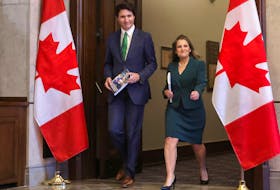OTTAWA, Ont. — Canada is not currently in a recession, nor is it heading for one, Finance Minister Bill Morneau said on Wednesday, disputing a notion that some economists have begun to contemplate in recent weeks.
“They would be incorrect,” Morneau said following an early morning speech in Toronto, less than 24 hours after he released the 2019 Federal Budget. “That would be technically wrong and certainly not in line with our expectations.”
A downturn in the economy could have significant bearing on the government’s fiscal plans.
The Liberal budget is based on expectations that GDP will grow by 1.8 per cent in 2019, and projects a deficit of $20 billion this year. By 2024, that deficit is expected to have fallen to $10 billion.
But economic growth in Canada was almost non-existent in the fourth quarter of 2019, due to a collapse of oil prices and a continued decline in housing and business investment.
Morneau said that the government had already projected two quarters of weak growth — the fourth quarter of 2018 and the first quarter of 2019 — but that it expects the economy will pick up steam after that.
“We’re expecting … that we will have a return to growth at expected levels in the second quarter (of 2019) and our long-term forecasts are positive,” Morneau said.
Earlier this week, Fidelity Investments portfolio manager David Wolf, a former advisor at the Bank of Canada, suggested that Canada may already be in a recession even if there haven’t been two consecutive quarters of economic decline. GDP shrank by 0.1 per cent in November and December, but Canada eked out 0.4 per cent growth in the fourth quarter.
Gluskin Sheff chief economist David Rosenberg has also said that recession is “unavoidable” this year and that if Canada isn’t already in one, it is one rung away on the ladder.
In the event Canada does enter recession, Morneau wouldn’t commit to further deficit spending.
He emphasized the government’s positive tone on the economy, focusing on the strength of the Canadian market and the unemployment rate, which is at its lowest in more than 40 years.
One of the driving factors leading economists to begin to hypothesize about a recession is the sharp decline in Canada’s housing market, which underwent a correction in 2018. The market fared no better to start the new year as sales in January were the worst since 2015. Household debt, meanwhile sits at a record 174 per cent of disposable income.
The Liberal government addressed concerns about housing affordability in the budget by investing $1.25 billion over three years to introduce a mortgage incentive for first-time homebuyers earning under $120,000 per year. For those who meet the criteria, the government will finance five per cent of mortgages on existing homes and 10 per cent on those that are newly constructed.
First-time home buyers will also now be able to withdraw $35,000 from their RRSPs — up from $25,000 — without paying taxes to pay for their homes.
Morneau expects the initiatives to increase the number of first-time homebuyers by up to 40 per cent, from the current mark of 100,000 per year to 140,000.
Under the plan, however, the total value of the incentive and the mortgage cannot exceed four times a participant’s income, or a maximum of $480,000, meaning that it may be of limited help to those looking for houses in the country’s most expensive markets — Vancouver and Toronto.
In February, the benchmark price for a home in the Greater Toronto Area was $767,800, according to the Canadian Real Estate Association. In Greater Vancouver, the benchmark price continues to exceed $1 million. Only average home prices in markets in Alberta, Saskatchewan, the East Coast and select areas in Ontario such as the Niagara Region and Ottawa are below $480,000.
“We expect that the initiative we put in place will have an impact across the country, including in Toronto and Vancouver,” Morneau said, emphasizing that the government had only considered measures that would not destabilize the housing market.
When asked if he had a back-up plan in case the Liberals’ housing measures don’t work or drive up demand even further, Morneau answered briefly: “These measures will work.”
By Victor Ferreira
Email: [email protected] | Twitter: VicF77
Copyright Postmedia Network Inc., 2019








